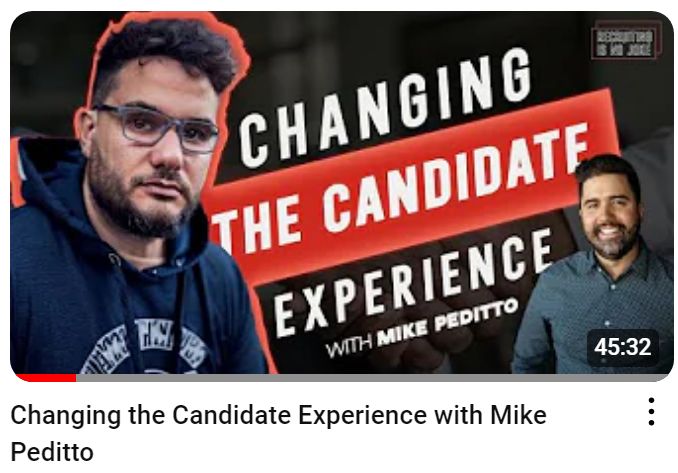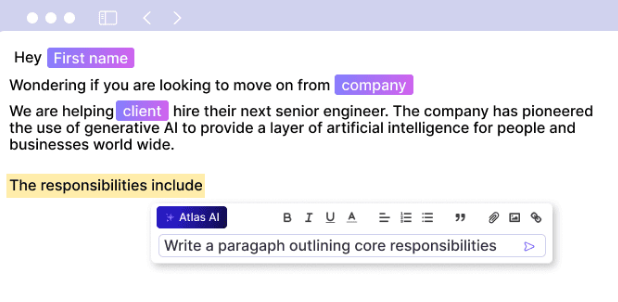
// Executive Search Best Practices, Recruitment Strategies, Recruitment Technology
Empathy and AI - A Path to Better Candidate Experience
27/09/2024
9 MIN
Executive search has shifted dramatically over the past decade. What was once a process driven solely by personal connections, headhunters, and countless rounds of interviews has been revolutionised by technology. Yet, at the heart of it all, the human experience remains a key differentiator.
For recruitment agency owners specialising in executive search, the focus has long been on the client – the organisation’s in need of top tier executives. But what about the other half of the equation? The candidate experience. Ensuring a positive candidate experience isn’t just a “nice to have” anymore, it’s a crucial aspect of the process that directly impacts your agency’s reputation, success, and future partnerships.
In this narrative, we’ll explore different aspects of candidate experiences in executive search, how AI recruitment platforms can play a key role in helping you improve the candidate journey.
What is meant by candidate experience? From first Impressions to lasting connections
Candidate experience refers to the overall impression and journey a job candidate has throughout the recruitment process, from the initial interaction with a company or recruitment agency to the final outcome – whether hired or not.
This includes how candidates are treated, the quality of communication, the transparency of the process, candidate feedback provided, and the efficiency of each step.
For executive search, where candidates are often passive and not actively job hunting, a positive experience is essential in attracting top tier executives.
A tale of two candidates – The good and the bad
Could a poor candidate experience impact your agency’s reputation?
Yes. Take Maria Alvarez’s example. A seasoned executive with 20 years of experience, she was approached for a C-suite role by an executive search firm. Initially intrigued, the position suited her well, and the company had a strong reputation.
But after the initial phone call, things started to unravel.
She went through a lengthy interview process with several rounds of interviews, skills assessments, and background checks. Weeks passed without clear communication from the recruiter. Vague or no responses left her feeling anxious and undervalued.
After months, she was finally told the company chose another direction. By then, Maria had lost interest, and the poor experience soured her view of both the company and the agency.
Maria’s story isn’t unique. In the high-stakes world of executive search, a bad candidate experience can damage your reputation and alienate top talent – sometimes for good.
So, what is a positive candidate experience?
Contrast Maria’s experience with James Carter’s, who was recruited for a similar C-suite role by a different agency. From the beginning, James’s recruiter set clear expectations about the process, timelines, and decision-makers.
The recruiter maintained constant communication, providing feedback after each interview and keeping James informed – even during delays, which he personally explained.
During negotiations, the recruiter ensured both parties felt respected. After James accepted the position, the agency followed up to support his onboarding.
This transparency created a positive candidate experience, leaving James with a favorable impression of both the company and the agency.
In today’s executive search market, candidates want more than a transactional hiring process; they seek an engaging experience. And while the pressure to deliver is high, there’s an opportunity for you to embrace technology that actually makes the candidate experience better, not worse.
What the CandE Pulse Survey Reveals About Candidate Experience
August’s CandE Pulse Survey by ERE Media gives us a fresh look at the changing priorities in recruitment, and it’s something recruitment agency owners should pay attention to.
Shifting recruiting and hiring priorities
While “Improving Processes” has long been the top focus, it now ranks third, overtaken by staffing levels and technology, which have risen to the first and second spots.
In today’s tight labour market, companies are prioritising team optimization and leveraging tech tools like AI recruitment platforms and applicant tracking systems to streamline hiring. But don’t think for a moment that candidate experience has fallen by the wayside. Coming in at fourth, candidate experience remains a critical component of the recruiting process, with feedback being key to identifying and fixing process issues.
For agency owners, it’s simple – while improving internal processes is important, having the right team and using the latest technology are essential to staying competitive. And don’t forget about candidate experience because it’s crucial for long-term success.
How employers view their own recruiting and candidate experiences
The recent survey shows a shift in self-ratings, with fewer employers claiming to be “competing” while more identify as “improving.” This trend indicates a rapid evolution in recruitment strategies.
Amid these changes, the role of AI in recruitment is becoming increasingly prominent. When asked if AI technologies are enhancing their recruiting efforts – such as in sourcing, screening, candidate communication, and interview scheduling. The responses of employers were revealing:
- 40% reported that AI is beneficial,
- 26% said it isn’t, and
- 6% were unsure.
Interestingly, 23% of respondents aren’t currently using any AI tools, while 5% indicated plans to invest in AI recruitment technologies in the future.
Despite its potential, many employers misunderstand AI’s capabilities, and candidates increasingly feel they’re being unfairly filtered out by these technologies.
This raises important questions like – Why do 26% of talent acquisition respondents feel that AI technologies aren’t helping, while 40% believe they are? Is it a matter of misrepresentation, underutilization, or lack of optimisation?
For agency owners, keeping an eye on these trends is essential for refining strategies and better supporting clients in today’s complex hiring landscape.
How AI Recruitment Platforms Can Enhance the Candidate Experience
As an agency owner, you’re always balancing the need for efficiency with the demand for personalisation, and managing both client needs and candidate satisfaction. This is where AI-powered recruitment platforms come in. While technology shouldn’t replace human interaction in executive search, it can enhance and simplify key parts of the process, ensuring candidates feel valued at every step of the way.
Automate busy work and prioritise the candidate experience
Imagine this, you’ve spent hours sorting through résumés, clicking through endless tasks in your ATS, scheduling interviews, and sending follow-up emails. It’s exhausting, and you know your time could be better spent building relationships with candidates and working closely with hiring managers.
In the world of executive search, candidate experience is everything, yet many agencies struggle to provide the high-quality, personalised service that top-tier talent expects.
This is exactly what Joel Lalgee and Mike Peditto explore in this episode of The Realest Recruiter.
They dive deep into a problem you know all too well – how recruiters spend too much time on repetitive, manual tasks and not enough time on the human side of the job.

Despite working with platforms which are designed to optimise candidate experiences, even they admit that the candidate experience, as it stands today, is lacking. The big question they pose is: how can AI help shift this balance?
Mike shares an important insight for agency owners like yourself – AI has the potential to transform how you work. Instead of spending hours on manual time consuming tasks like sourcing, outreach, scheduling, and note taking, you can use AI tools to automate them, freeing you up to focus on more meaningful tasks, like providing candidates with personalised feedback or collaborating with hiring managers on strategic hiring decisions.
The idea is not to replace your expertise with technology but to enhance it, to automate the mundane so you can prioritise what really matters.
Tired of manual tasks? It’s time for a change!
Atlas automates your recruiting process, handling everything from sourcing and personalising outreach to note-taking and scheduling. With these tasks streamlined, you can focus on improving the candidate experience and strengthening your agency’s reputation.
See it in action
Personalise the candidate experience at scale
Picture a recruitment process where every candidate feels valued, even if they don’t get the job. Wouldn’t that be ideal?
That’s the idea explored in this episode on Matt Alder’s Recruiting Future podcast.

He speaks with Luke Smith from Toyota GB and Euan Cameron, CEO of Willow, about how technology is changing recruitment – making it more personalised and scalable than ever before.
If you’re looking to generate polished initial drafts quickly from job details like notes and descriptions, try our AI first drafts feature.
It makes sure your messages are refined and maintains a consistent writing style.
Automation doesn’t have to be impersonal. It can actually serve as a tool to improve personalization at scale. For example, recruitment platforms now use AI to extract useful information – like a candidate’s availability or preferences – so you can tailor your responses effectively.
Even when candidates don’t land the job, the experience you offer can leave them as advocates for your brand. Luke Smith emphasised that every candidate should leave feeling positive about the brand, whether or not they were hired. This strategy can turn applicants into future customers and brand advocates.
While AI and automation will continue to evolve, the real key is maintaining the human element. Candidates don’t want to feel like just another number. They want to know their application is valued. Technology should enhance, not replace, those vital touchpoints.
As a recruitment agency, your feedback can shape the tools you use. Companies like Atlas are continuously evolving based on user feedback, allowing you to influence the technology for better outcomes – not only for your agency but for the entire recruitment industry.
FAQs About Candidate Experience in Executive Search
Why is candidate experience so critical in executive search?
Executive-level candidates are often passive job seekers who aren’t actively looking for roles. A poor candidate experience can lead them to withdraw from the process, damage your agency’s reputation, and deter future candidates from engaging with you.
How do I know if my candidate experience needs improvement?
Start by gathering feedback from past candidates. Use AI tools for sentiment analysis or simple post-interview candidate experience surveys. If candidates consistently mention unclear communication, long timelines, or lack of feedback, it’s time to reassess your approach.
How do you evaluate candidate experience?
Candidate experience can be evaluated through various methods:
- Surveys – Conduct post-interview or post-process candidate experience surveys asking them to rate their experience at different stages (communication, interview process, feedback, etc.).
- Net Promoter Score (NPS) – Ask candidates how likely they are to recommend your recruitment agency to others.
- Interviews or Focus Groups – Gather qualitative feedback by directly speaking with candidates about their experience.
- AI Sentiment Analysis – Analyse email and communication patterns to detect positive or negative sentiment.
- Hiring Metrics – Track time-to-hire, offer acceptance rates, and how many candidates drop out of the process.
What is the candidate experience score?
The candidate experience score is a metric used to measure the satisfaction of candidates throughout the recruitment process.
This score is often derived from surveys or feedback tools where candidates rate their experience on factors such as communication, fairness, feedback, transparency, and overall professionalism.
The score provides recruitment agencies with insights into areas that need improvement and helps benchmark the effectiveness of their hiring process. Some platforms also incorporate NPS-style questions, like “Would you recommend this agency to a colleague?” to calculate the overall score.
Can technology really improve a human process like executive search?
Absolutely. AI and automation are there to assist, not replace, human interaction. By streamlining administrative tasks, enhancing communication, and providing data-driven insights, technology frees up recruiters to focus on the human aspects of the job – building relationships, managing expectations, and offering a personalised experience.
What’s the biggest mistake agencies make in candidate experience?
Lack of communication and transparency. Candidates, especially at the executive level, want to feel informed and valued. Leaving them in the dark, even unintentionally, can lead to frustration and disengagement.
Final Thoughts – Put the Candidate First
In the world of executive search, it’s easy to focus solely on the client, but the candidate experience is just as important. As agency owners, your reputation is built not just on placing the right leader but on how you handle the journey.
By combining human empathy with AI-driven tools, you can ensure a smooth, transparent, and respectful process for all candidates. And in an industry driven by relationships, that’s what will set you apart.
Whether it’s James or Maria walking through your doors, make sure their journey is one they’ll remember for all the right reasons.
It is no longer just about filling a role. It’s about creating a human connection. Small gestures, like remembering a candidate’s pet or recent vacation plans, can turn an otherwise transactional process into a memorable experience. It’s this kind of personal touch that builds lasting relationships, and ultimately, a positive brand reputation.
It’s about creating an inclusive, engaging, and personalised experience that builds long-term loyalty. Whether through automation or AI, the balance of efficiency and human touch will define your agency’s success in the future of recruitment.
As Mike puts it, the future of recruitment belongs to those who embrace AI, not fear it. Agencies that leverage AI to handle repetitive tasks will find more time for relationship-building and ensuring a positive candidate journey, ultimately defining your success.




















